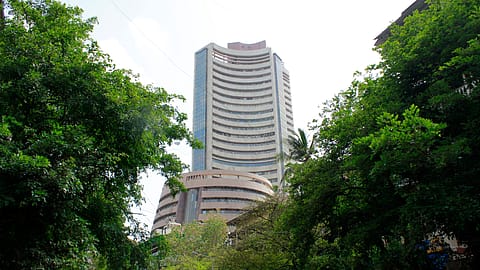Markets end in the green for 3rd consecutive day
Shorts’ covering on expiration day of March futures and options contracts helped the Sensex and the Nifty 50 gain 1,410 and 323 points each.

Equity markets closed in the green for the third consecutive day on Thursday. Psychologically, this is important for investor sentiment, for the week began rather badly: benchmark indices hit the lower circuit, trading had to be halted, and finally after the mayhem, the market closed more than 13% lower.
Trading on Thursday began on a positive note, influenced by Wednesday’s near 7% gain. In early trade, the S&P BSE Sensex and NSE Nifty 50 gained 1,564 points (+5.48%) and 431 points (+5.18%) each, to the touch the day’s high at 30,099.91 points and 8,749.05 points respectively.
At the end of the day, the Sensex closed at 29,946.77 points, gaining 4.94%, while the Nifty 50 gained 3.89%, closing at 8,641.45 points.
Meanwhile, the relief package announced by finance minister Nirmala Sitharaman got a lukewarm response from the market. In a 45-minute media address, which began a little after 1.15 p.m., Sitharaman and minister of state for finance Anurag Thakur explained the measures adopted as part of the ₹1.70 lakh crore package aimed at helping people who face the most risk of disruption arising from the three-week nationwide lockdown to combat the spread of the new Coronavirus.
According to S. Ranganathan, head of research at LKP Securities, the indices continued to exhibit strength for the third consecutive day alongside the government’s announcement of the package for the society’s weaker sections. “The market rally today was broad based led by short covering in financials accompanied by value buying across sectors,” says Ranganathan. “Dormant retail investors also are seen coming back to markets seeing attractive valuations on several stocks which are clear signs of maturity,” he adds.
On the relief package, Vinod Nair, head of research at Geojit Financial Services, is of the view that it will provide a solid support to rural and semi-rural economy due to high amount of benefit in term of food, cash in hand and job safety. Further, for the markets, Nair opines that the package will provide safety to defensive stocks like the staple industries but does not provide any relief to corporates like banks, and hospitality companies among others.
“It seems that the majority of the benefits announced are factored in the market given more than 15% bounce from the recent low,” says Nair. “The recovery of the market will continue if strict lockdown system is implemented in the developed markets, and number of new virus cases reduces."
Recommended Stories
Further, on the economic package, Jaspal Bindra, executive chairman of Centrum Group is of the view that the government has made provisions to ensure that families belonging to poor and lower to middle income are able to carry out their daily lives smoothly. Calling the lock down move timely and appropriate, Bindra talks of awaiting relief measures for corporate India as well as small entrepreneurs, startups, and other affected stakeholders, etc. “We anticipate the rest of the economic packages and hope they are designed to overcome the disruptions in the rest of society,” he adds.
In terms of anticipating further measures, Bindra has company from Rajnish Kumar, chairman of State Bank of India. Kumar hails the government for the nationwide lockdown which would help India to stay ahead of the curve in fighting the global pandemic. He also opines that the economic package will now impart a definite direction to India’s fight against coronavirus. “Overall it’s a very well defined package reinforcing government’s intent that no one should be deprived of basic facilities in today’s stressed times,” says Kumar. “We are hopeful of more calibrated responses in coming weeks as the impact of pandemic unfolds,” he adds.
Back to the equity markets, given that foreign portfolio investors have recorded an outflow of over ₹55,600 crore, or $7.5 billion, in the current years, the sustainability of the market uptrend is a crucial factor. But, the Coronavirus numbers shall have a strong say in the way equity markets behave.